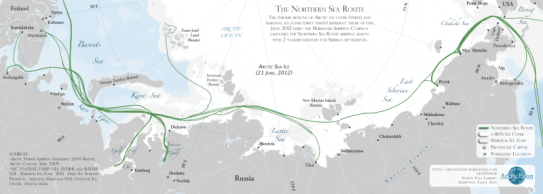China’s Arctic Passage Ambitions Grow with Arkhangelsk Port Development

The redevelopment of Russia’s Far North-Western Arkhangelsk Port to Deep Water facilities has profound implications for Russian and Chinese shipping and the development of the Northern Sea Route. Regional Governor Igor Orlov has stated that the first stage of the port on Russia’s North-West Arctic coastline will be operational by 2025. The port has access to the White Sea and offers passage across the Northern Sea route. This would provide shipping passage east through the Arctic Ocean to China’s north-eastern coast and Japan, via the Bering Straits, and west through to northern Europe and beyond.
Related Reading Arctic Sea Routes Opening Up For China
Chinese investment is involved in this, and the port is ultimately expected to have a capacity of 30 million tons of cargo – double that of Murmansk, and one of the world’s top 50 largest facilities. As such, the port will also facilitate the transportation of oil from the Ural Mountain region of Russia through to China by sea, as well as bilateral trade in goods between the two countries. China is currently negotiating with Russia to make a Free Trade Agreement with the Eurasian Economic Union.
The Northern Sea Route is a somewhat controversial shipping passage, opening up due to global warming. It lies entirely within the Arctic Ocean, with parts of it only ice free for two months each year. The melting sea ice is likely to result in “remarkable shifts in trade flows between Asia and Europe, diversion of trade within Europe, heavy shipping traffic in the Arctic and a substantial drop in Suez traffic” according to the Paper Melting Ice Caps and the Economic Impact of Opening the Northern Sea Route.
Related Reading Russia to Send Oil to China Via Northern Sea Route
Meanwhile, construction of the Arkhangelsk facility is well underway. That in itself demonstrates the forward planning and the patience shown by both the Russians and the Chinese in expecting a return on investment (RoI). While Western financed projects are often funded with a short-term RoI expected, the Eurasian bloc is seemingly able to tolerate much extended credit lines prior to securing capital returns, with the Arkhangelsk facility not expected to reach capacity until 2030.
About Us
Silk Road Briefing is published by Asia Briefing, a subsidiary of Dezan Shira & Associates. We produce material for foreign investors throughout Eurasia, including ASEAN, China, India, Indonesia, Russia & Vietnam. For editorial matters please contact us here and for a complimentary subscription to our products, please click here.
Dezan Shira & Associates provide business intelligence, due diligence, legal, tax and advisory services throughout the Asian and Eurasian region. We maintain offices throughout China, South-East Asia, India and Russia. For assistance with OBOR issues or investments into any of the featured countries, please contact us at silkroad@dezshira.com or visit us at www.dezshira.com
Related Reading:
Silk Road and OBOR Business Intelligence
Dezan Shira & Associates´ Silk Road and OBOR investment brochure offers an introduction to the region and an overview of the services provided by the firm. It is Dezan Shira´s mission to guide investors through the Silk Road´s complex regulatory environment and assist with all aspects of establishing, maintaining and growing business operations in the region.
 China’s New Economic Silk Road: The Great Eurasian Game & The String of Pearls
China’s New Economic Silk Road: The Great Eurasian Game & The String of Pearls
This unique and currently only available study into the proposed Silk Road Economic Belt examines the institutional, financial and infrastructure projects that are currently underway and in the planning stage across the entire region. Covering over 60 countries, this book explores the regional reforms, potential problems, opportunities and longer term impact that the Silk Road will have upon Asia, Africa, the Middle East, Europe and the United States.
 A Single Economic Space From Lisbon to Vladivostok
A Single Economic Space From Lisbon to Vladivostok
This issue of Russia Briefing introduces the idea of a single economic space between Lisbon and Vladivostok. It presents the history of this concept as well as the potential benefits if it had been realized.







